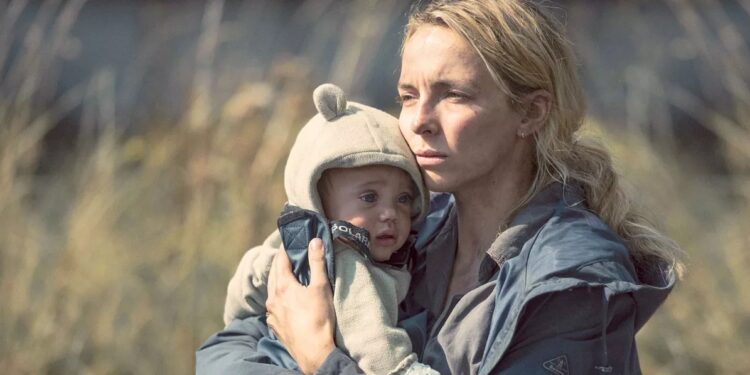Like many eco-conscious film buffs, I’ve seen Don’t Look Up many times, and shown it to my friends and family whenever anyone suggests a movie night.
Now I’m looking forward to discussing The End We Start From, the new 2024 release starring Killing Eve star Jodie Comer. The Liverpudlian actress plays a new mother trying to find refuge with her baby as London is submerged by flood waters.
As someone concerned about climate catastrophe, I rarely pass up the opportunity to educate my loved ones in an entertaining or thought-provoking way. It’s a refreshing break from the usual doom-mongering that conversations can often descend into.
The power of cinema in communicating the climate crisis is undeniable. This is becoming increasingly apparent in my own research on the history of the environmental movement in the UK. Certainly during the last two decades, I’ve noticed a more concerted effort within cinema and television to directly address the issues of climate catastrophe.
Given the complexities behind the science of climate change, good communication plays a critical role in affecting public attitudes and behaviours in relation to environmental justice. Yet it’s only relatively recently that the role of cinema, and narrative visual fiction more broadly, has been taken seriously as having a role in that communication.
Creating emotional connection
There are many benefits to using fictional narrative as a tool to connect an audience with environmental issues.
First, this appeals to our emotions in a way that a scientific presentation, academic paper or broadcast interview rarely can. Ultimately, films have a unique way of engaging our emotions, which is a vital step in driving changes in people’s behaviour.
Films can leverage this by presenting climate messages within fantastical narratives that seasoned movie watchers will be familiar with. In the case of Don’t Look Up, it’s meteor strikes. For Mahalia Belo’s The End We Start From, it’s extreme flooding.
But even without such strong visual representation, films that centre around personal journeys towards realisation can be equally as powerful. In Paul Schrader’s brilliant First Reformed, climate activism is the predominant focus.
Second, films and television dramas can bring the immensity of climate catastrophe down to earth by incorporating everyday events. The interpersonal dynamics in the BBC television series Years and Years, a six-part drama that follows three generations of a Manchester family between 2019 and 2034, helps viewers relate to the characters’ experiences. This is a proven tactic that embeds climate issues into public debate, as it conjures a personal connection and makes the climate message more accessible and effective.
The End We Start From follows the everyday experience of having a newborn child, but set in the midst of an extreme flood in London. This creates a visceral emotional connection between the themes of the film and the viewers’ own experiences. The emotional journeys of the characters mirror the audience’s fears and hopes. This creates a strong empathetic link that can help people change the way they behave far more than facts and data can.
Third, the stark imagery of environmental devastation, aided by increasingly spectacular special effects and CGI leaves a lasting visual imprint. This enhances public awareness and concern. The Day After Tomorrow, released in 2004, can be considered the first climate blockbuster.
While it had a relatively small immediate impact on changing people’s opinions on climate change, it laid the ground for more cinematic explorations of climate change-related visuals, and the real world impact of extreme weather events, rising sea levels and rapid temperature changes.
Welcome to the age of ‘cli-fi’
More than just the effects though, it has been argued that the skill of storytelling can impress climate science on viewers’ minds far more effectively.
Often labelled “cli-fi”, the melding of science fiction stories with dystopian climate futures uses a post-climate breakdown as the scene for the film’s imagined narrative. In so doing, films such as Bong Joon Ho’s masterpiece Snowpiercer or George Miller’s Mad Max: Fury Road convey the gravity of the very real issues of the social, cultural and political effects of climate catastrophe.
Of course, the growing genre of climate change cinema is not always scientifically accurate. But if cinema is to be used more forcefully as a tool to raise the public awareness of climate catastrophe, then accuracy is not entirely necessary: it is the emotional connection and compelling storytelling that are most crucial.
Films like The End We Start From and Don’t Look Up are not just entertainment, they are essential tools in educating and mobilising public opinion. As we face the escalating challenges of climate catastrophe, embracing diverse and emotionally engaging storytelling in mainstream media becomes imperative. It’s through these narratives that we can foster a more informed, concerned and proactive global community.
Don’t have time to read about climate change as much as you’d like?
Get a weekly roundup in your inbox instead. Every Wednesday, The Conversation’s environment editor writes Imagine, a short email that goes a little deeper into just one climate issue. Join the 30,000+ readers who’ve subscribed so far.![]()
Oli Mould, Professor in Human Geography, Royal Holloway University of London
This article is republished from The Conversation under a Creative Commons license. Read the original article.














